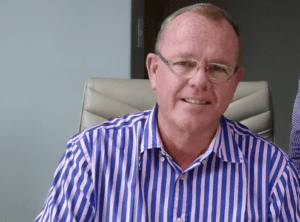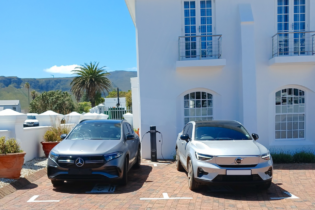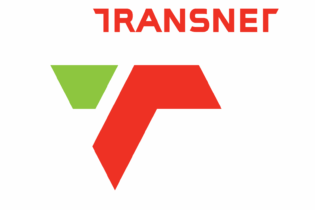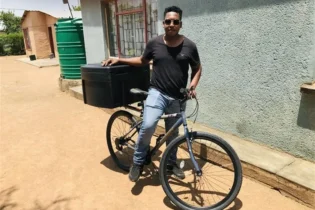The first truck drove out of the yard in 1982 and since then the Reinhardt Transport Group has become a dominant force in moving bulk commodities for the export market. Graham Gaskell, deputy CEO at Reinhardt Transport, speaks to Simon Foulds about the growth of the company and its future.
Derick Reinhardt established the company, merging with Amalgamated Bulk in 1999 and purchasing Chrome Carriers in 2001. Initially, the three entities were operated separately until they were merged under the umbrella of the Reinhardt Transport Group. In 2010, Amalgamated Bulk was fully integrated into Reinhardt Transport, resulting in two transport brands operating within the group. Reinhardt Transport is based in Nigel with Chrome Carriers situated in Rustenburg. Fleet size The total fleet size comprises489 6×4 bulk tipper and interlink combination,259 of which are at Chrome carriers and 230 at Reinhardt transport 230. The main trailer supplier for the company is Afrit. Chrome Carriers operate the MAN and Scania brands while DAF and Volvo trucks are used at Reinhardt. At the Nigel operation there are 114 DAFs, with Volvo making up the balance and at Chrome Carriers there are 144 MANs with the rest being Scania. “There are no bad vehicles around. Two of the distinguishing factors for us are that the back-up is an extremely important factor along with the safety features,” says Gaskell. “One of the successes of our business has been the equity that gets created in the fleet. We like to think that at the end of our three-year,600 000 km policy, we have a market for the vehicle when it needs to be replaced. This is an important part of the purchase decision. Probable the most important aspect for us, however, is the fuel efficiency of the relevant vehicle. The cost of fuel is huge for every operator and for us constitutes 81% of the overall operating cost of using a vehicle over a three-year period. This aspect is key for us in choosing a vehicle for our operations.” He says that late last year the group had all of the major brands doing semi-controlled tests with on the company’s routes with its cargo. Drivers were also rotated among the different brands to ensure there was a fair assessment from the different brands, allowing the group to find the most fuel efficient vehicle for its particular operations.“From our internal tests we found the most fuel efficient vehicle we had is the Scania followed very closely by the MAN.” “We have got very good watertight service level agreements with the suppliers – from a technical support point of view. For service intervals they are allowed a certain time and if they exceed this time they have to supply a back-up vehicle. The OEM service agreements are analysed on a monthly basis to ensure they stick to their agreements.” Outsourced maintenance The company has outsourced all maintenance to the OEMs, which are expected to deliver outstanding service on a continuous basis. “We outsourced all our maintenance facilities four years ago. Our own technical staff monitor the relevant OEMs ensuring they continuously meet our high-standard requirements and operate according to our agreed upon standards. All the vehicles are monitored on-site and at the monthly technical meetings we go through a variety of technical issues measured against the agreed upon KPIs. Our main workshops are in Nigel and Rustenburg.” Driver training“A vital and important aspect is driver training. We have a very comprehensive in-house driver training programme. We have 12 full-time driver trainers within the group and we have our own driver academy where all our drivers undergo theoretical training as well. Here drivers are educated on health issues, driving attitudes and techniques along with basic administrative duties.
Gaskell says the group has its our own in-house clinic where drivers undergo a medical twice a year, during which eye-sight and hearing are tested, among other things. Drivers also undergo all relevant OEM training to keep them updated on the best driving techniques for the relevant vehicle they drive. “On top of this we have a detailed monitoring process, particularly from a fuel point of view, but also regarding harsh braking and other relevant driving issues. So when we see a driver is not achieving a benchmark we put them through a training programme. It is an ongoing process and from a theoretical point each driver gets retrained once a year. “There are 600 drivers at the company and regarding the practical training aspects for each driver we focus on where he is having a problem with his driving technique as picked up through the driver monitoring process. Once the driver has been through a training session you immediately see an improvement in fuel saving and his driver habits.” Monitoring He adds that the operations centres monitor all vehicles 24/7. C-Track is used to monitor all the trucks within the Reinhardt Transport operations in Nigel and Net Star at the Chrome Carriers operation. This is to both monitor the routes the trucks travel along with the drivers driving skills. The reports are in real-time and any excessive bad driving habits can be addressed immediately with the relevant driver. “The regular driver reports are also used for rating the drivers if they drive within the green band. This forms part of ap rogramme where drivers are incentivised on their fuel consumption and productivity. “Twice a year in June and December, we award the best driver with a car. It is quite remarkable how much of an incentive this has become and the great impact it is having on our fuel consumption. It has been well received by all our drivers.” The future “We are optimistic about the future growth expansion. Though we have a sizeable fleet we would still like to grow the business in a focused manner. This will probably be more of a geographical expansion as opposed to diversifying into different segments.” Gaskell says: “We are looking at the territories north of South Africa–Zambia, Zimbabwe and Mozambique – but we would like to stick to what we know best and that is transporting bulk products.” The company currently transports bulk produce to Maputo and Durban, and has a model that works for them. “I think we can replicate our model into operations that are similar to us, but who are not as large as us. Our major clients are Phalaborwa Mining Company, African Rainbow Minerals, Sasol, Samancor, Xstrata, Lances and Arcelor Mittle. About 75% of our work is in the resources, 15% in coal and 5% in agriculture. “We are ISO 9000 accredited and are just going through the RTMS accreditation now and these are very good things in terms of levelling the playing fields for operators.”





